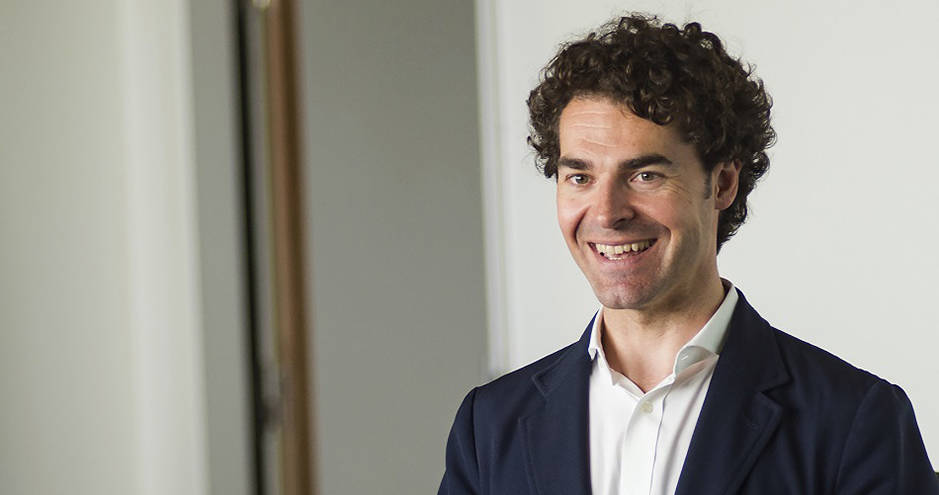Europe at a Crossroads?
Uncertainty surrounding Brexit, Franco-German debates, rising populism and European elections…: what lies in store for the European Union? The HEC-Viavoice debate on March 12 welcomed the views of Alberto Alemanno, HEC professor and Jean-Monnet Chair in European Law.

“It was once fashionable to be pro-European, but now it seems, that is no longer the case.” In response to a question from François Miquet-Marty (president of Viavoice) on having pro-European convictions, Alberto Alemanno underlined the singularity of the current situation. A Schengen Area which has all but disappeared, a major state (the U.K.) leaving the Union, the emergence of far-right governments in eastern Europe and Italy, substantial debates between France and Germany: the signs are all there to indicate a new phase in the European Union.
“Unprecedented” European Elections
Every five years, the European Parliament elections are a hallmark moment, not of European, but of national democracy as they are held separately in each member state, often on different dates. However, the 2019 elections will be “unprecedented”, in the view of Alberto Alemanno, who emphasized “the new divide” between pro-Europeans and Euro-skeptics and, more broadly, an increasing awareness of the impact of the European Union on our lives. He nevertheless noted that these so-called “European” elections are still taking place today in EU countries on the basis of national lists, and are therefore carried out by the national political parties. “In this sense, the political Europe does not exist yet,” said the specialist in European law.
In national political debates, the European Union is frequently used as a scapegoat and therefore European elections often become a platform for discussion of national politics rather than the broader European context. The scheduling coincidences adumbrate this asymmetry more clearly in certain countries: in Spain for example, elections on April 28 will bring into opposition a coalition of the left and a coalition from the center to far right, including the Ciudadanos party. This is the same party, according to Alberto Alemanno, which will participate in the May 26 European elections in alliance with Emmanuel Macron’s party and which may call for the defeat of European populists.
According to the founder of The Good Lobby, Europe does not come from above, but from below. The European Union does not replace nation-states because each of us has multiple identities. Most of today’s issues demand answers on a European scale. However, the political system in European countries has unfortunately not yet mirrored the ‘Europeanisation’ of society, precipitating an even deeper chasm. This is why all countries, and each political group, left or right, harbor some level of skepticism towards the European Union.
What Post-election Majority?
For Alberto Alemanno, the ongoing restructuring of the political system is so deep in many European countries that it may be difficult for the current majority, composed of the European People’s Party (EPP) and the Party of European Socialists (PES), to stay in power after the elections of May 26. The current situation has many causes but, according to Alemanno, its most notable cause is a lack of ideas, an “intellectual void” which permeates the European debate today. All national parties are supposed to position themselves on a European scale; but what he sees shared by all of the major European political bodies is a lack of any truly European projects or leaders.
European Elite?
Does the 3.4% of Europeans living outside of Europe constitute an elite? Alberto Alemanno analyzes the sociological composition of these “European migrants” and their often-misleading characterization. Although these members of the European population (approximately 17 to 18 million people) are slightly more educated than average EU citizens, their overall profile is identical to that of average Europeans. They arguably constitute a new genre of social class or group but by no means can they be categorized as an elite or a militant pro-European faction: only 8% of them are registered on the electoral lists of their host countries and only 4% of them voted in the previous European elections of 2009 and 2014. What seems at first glance like the most active and most “European” cross-section was in fact the least politically represented.
However, Europe is not only a geo-political area, it is also a mental space, as shown by the success of the Erasmus program which allows millions of young Europeans to discover their continental counterparts, as well as the many exchanges between workers and researchers within Europe. “According to European law, we have to move”, says Alemanno. However, in reality, around 50% of citizens are exposed to Europe for personal reasons (family links, friends, cultural exchanges…). This means that the other half of European citizens are not exposed to the broader European community. This certainly explains part of the current political situation. Europe should be viewed as a source of opportunity: 28 countries means EU citizens have 28 times more chance of accessing new cultures, new markets and people who are different yet share a certain European commonality.
And if unexplored proposals were nestling inside new projects? For Alberto Alemanno, our era will be the battleground for visions of society that are outside the box: “New ideas today do not come from the center of Europe’s political battleground. For example, we can argue that Yanis Varoufakis’s proposal is unfeasible but we cannot dispute its originality. It has a genuine overall vision. There are also the proposals by the truly transnational Volt movement. The different pro-European political parties have to develop a shared vision of the future or they open the doors to restrictive Euro-skeptic ideas, like Germany does by maintaining the status quo.”